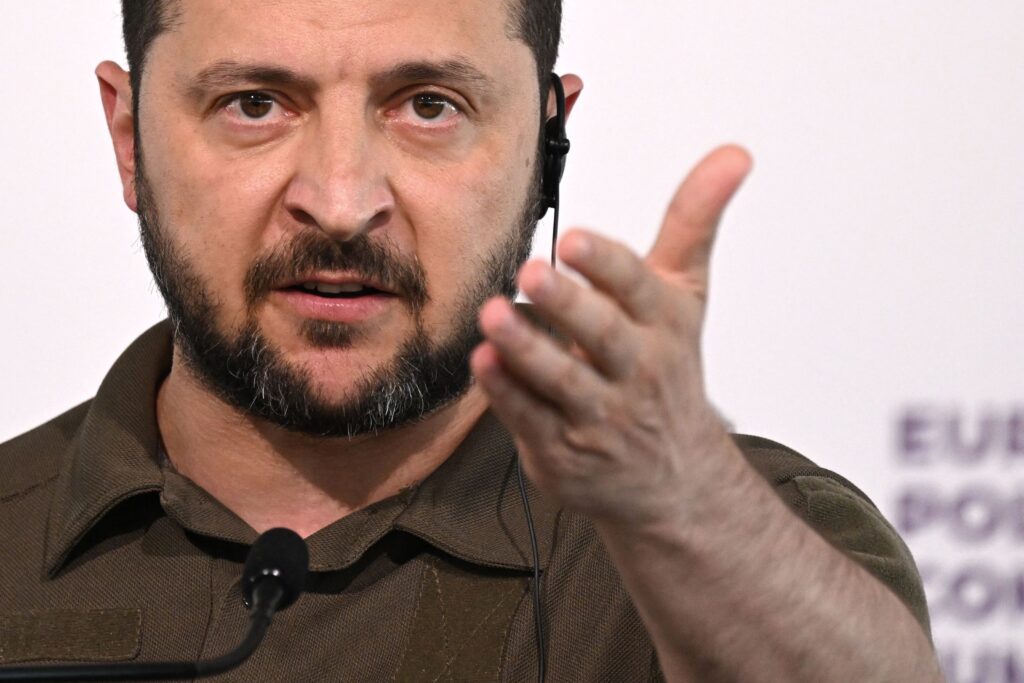Press play to listen to this article
Voiced by artificial intelligence.
BULBOACA, Moldova — European leaders mounted a powerful show of defiance — and support for Ukraine — as they gathered Thursday for a historic summit in the ex-Soviet country of Moldova just kilometers from the Ukrainian border.
But even as over 40 leaders pledged their solidarity with Ukraine at the second gathering of the so-called European Political Community, the difficulty in maintaining that unity was on display. Before and during the summit, leaders hedged and staked out competing positions on an increasingly contentious issue — what security guarantees the Western alliance can give Kyiv to ensure that if Russia is ever pushed out, it won’t return.
French President Emmanuel Macron set the tone on Wednesday, imploring allies to offer Kyiv “tangible and credible” security guarantees — a shift in the French position. His German counterpart, Olaf Scholz, was more hesitant on Thursday, declining to provide any details and indicating it might be a question for after the war.
Against this backdrop, Ukraine’s own leader, Volodymyr Zelenskyy, joined the leaders in a surprise appearance. Under a crisp blue sky, Zelenskyy made two explicit demands: One, a “clear invitation” to join NATO — another subject that divides allies — and “security guarantees on the way to NATO membership.”
Both, he said, “are needed.”
The divergent positions illustrate the fraught questions that lie ahead as the West strives to hold together against Russia and the war grinds on. Yet, for now, unity is still the predominant rhetorical theme when European leaders gather.
“Today’s summit showed us how valuable the European Political Community is,” Moldovan President Maia Sandu said as the summit drew to a close. “We have shown that we are a family, a strong and united family of European nations acting together to make the continent stronger — more united and more peaceful.”
Zelenskyy’s plea
The summit at Castle Mimi, a vineyard only 20 kilometers from the Ukrainian border, kicked off on an emotional note with Zelenskyy’s arrival.
Sandu welcomed the Ukrainian president ahead of the other leaders, thanking him profusely for “keeping Moldova safe.” The side-by-side image of the two leaders, whose countries have both been battling Russian aggression to various degrees, was a powerful symbol.
But with Kyiv under an intensifying hail of Russia’s bombs, Zelenskyy moved swiftly to his plea, asking allies to give Ukraine firm security guarantees and a commitment to NATO membership at an upcoming NATO summit in Lithuania. NATO agreed in 2008 that Ukraine would eventually become a member, but it has never offered a firm promise or timeline.
While Zelenskyy is unlikely to get everything he wants at the July gathering, both issues are being hotly debated at the moment.
Macron set the stage on Wednesday when he turned heads with his most forthcoming remarks yet about security guarantees.
“I’m in favor — and it will be the topic of collective discussions in the coming weeks — of giving tangible and credible security guarantees for two reasons: Ukraine protects Europe today and she gives Europe security guarantees,” he said.

But on Thursday, Scholz, the German chancellor, was more guarded.
“One thing is very clear: We are now making our contribution to supporting Ukraine,” he said. “We have always said that there must also be guarantees for a peace order after the war. Germany will make a contribution to this.”
Scholz then refused to be drawn into the details of the discussion, even as it moved to center stage.
Still, both Scholz and Macron confirmed that allies are actively discussing the subject, and working to coordinate their approaches ahead of the NATO summit.
Speaking in Oslo on Thursday, NATO Secretary-General Jens Stoltenberg was similarly careful when addressing the touchy subject.
“When the war ends, we need to ensure that history doesn’t repeat itself, that this pattern of Russian aggression against Ukraine really stops and therefore, we need to have in place frameworks to provide guarantees for Ukrainian security after the end of the war, so history doesn’t repeat itself,” he said.

The lack of clarity reflects the complexity of offering — or even defining — “security guarantees” for another country. Europe may also be waiting to take its cue from the U.S. One option on the table may reflect the security model binding the U.S. and Israel, which prioritizes arms transfers and long-term support commitments.
Nonetheless, Scholz, speaking at the conclusion of the summit, was keen to stress that helping Ukraine defend itself was “the task at hand.” And he ruled out NATO membership for Ukraine at this juncture.
“There are clear criteria for membership. You can’t have border conflicts for instance,” he said — an obvious reference to Ukraine.
Scholz’s remarks reflect the broad understanding that Ukraine cannot join NATO so long as it’s actively at war with Russia. But Ukrainian officials want NATO leaders to offer a concrete political gesture that Kyiv is at least on the membership path.
Some NATO allies are willing to be far blunter than Scholz on the subject, most notably those representing the Baltic countries, highlighting yet another fissure that separates allies.
“The only security guarantee that works … is NATO membership,” Estonian Prime Minister Kaja Kallas said Thursday, echoing Zelenskyy’s message.
